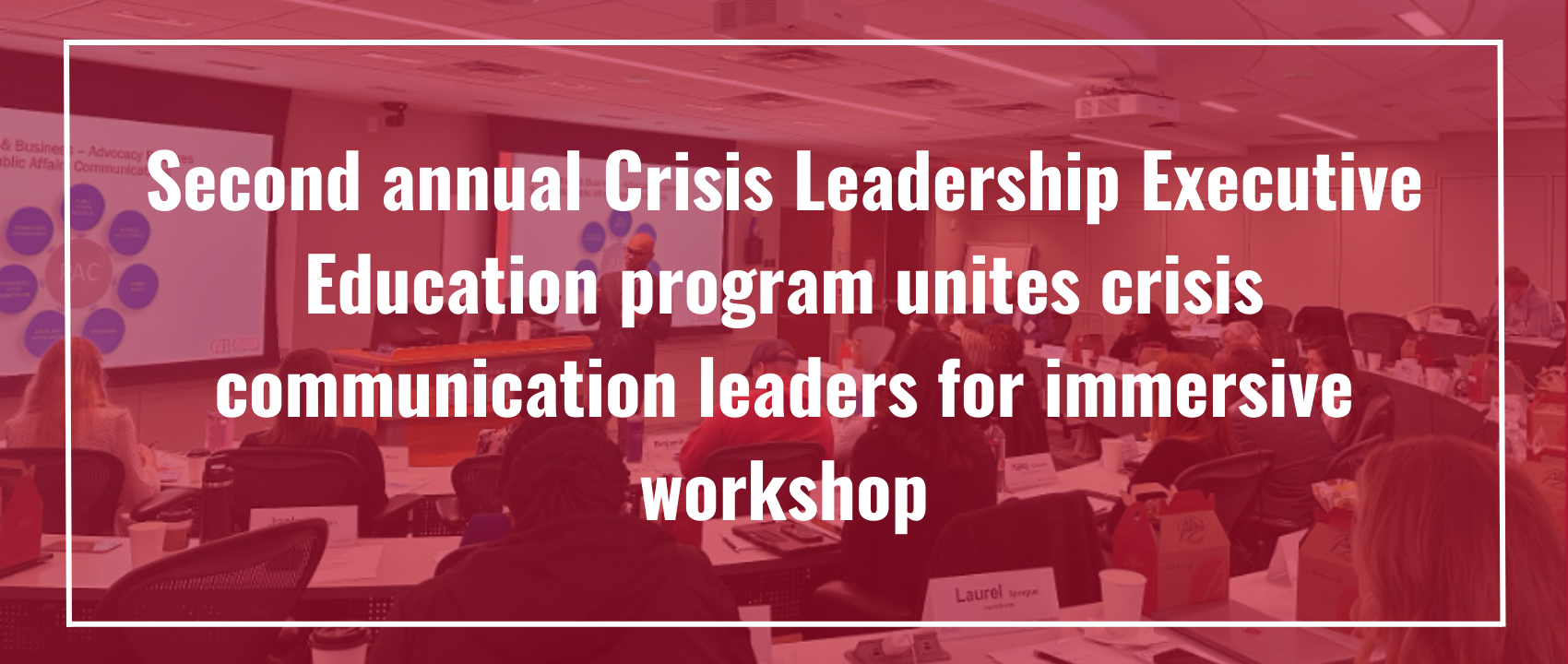Second annual Crisis Leadership Executive Education program unites crisis communication leaders for immersive workshop

Second annual Crisis Leadership Executive Education program unites crisis communication leaders for immersive workshop
On March 20, 2025, the Crisis Communication Think Tank (CCTT) at Grady College of Journalism and Mass Communication, in partnership with Terry College of Business, UGA School of Law and UGA School of Public and International Affairs, hosted its second Crisis Leadership Executive Education workshop in Atlanta, Georgia at the Terry Executive Education Center. The event gathered crisis communication professionals, business leaders and legal experts for an engaging and dynamic day of learning, networking and practical scenario-based exercises designed to enhance crisis readiness.

The program featured a total of four sessions, each facilitated by experts from various fields of crisis and risk management. The topics covered included READINESS, Business and Strategic Communication, Benefits of Legal Astuteness, Public Affairs & Business and Stakeholder Management. These sessions provided valuable insights into building robust crisis response strategies, strengthening organizational resilience, and navigating the complex landscape of legal, media, and stakeholder relations in times of crisis.
Matthew Auer, Dean of the School of Public and International Affairs and Arch Professor of Public and International Affairs at UGA, led a session on Public Affairs & Business as a facilitator quoted: “A key benefit of CCTT Executive Education is the ‘pressure testing’ of concepts and tools that occurs with assembled participants,” said Auer. “When an instructor introduces a concept, it tends to resonate almost immediately with participants. That’s because everyone in the room has excellent, relevant experience, and they bring insights and nuances to whatever is being taught. It’s the best possible kind of classroom experience.”

Following the sessions, participants engaged in The Keystone Experience on Public Affairs Communications, a simulation exercise that challenged them to apply their newly acquired knowledge in real-time. This exercise, focused on crisis management, fostered deeper engagement among attendees and encouraged cross-disciplinary collaboration, as they worked together to develop response strategies with limited information, mirroring the pressure and urgency of actual crisis situations.
“The UGA Crisis Communications Think Tank provides an invaluable opportunity for professionals to engage in forward-thinking discussions on crisis readiness, response strategies and emerging industry challenges,” said Laurel Sprague, Brand Reputation Manager of Inspire. “Experienced crisis leaders can gain fresh perspectives and new considerations to enhance mature crisis programs in an ever-changing landscape.”
April Sorrow, Vice President of Communication at Jackson EMC, noted the continued value of the program. “As a second-year participant, I continued to learn from the program speakers and those in the room as we discussed the importance of crisis readiness and worked to build a network of communication professionals who will continue to lean on each other’s skills and expertise in the months and years to come. I have found this group, and the Crisis Communication Think Tank, to be a critical part of my professional network.”

“Crisis communication is not something most of us studied in college, yet we face it almost daily,” said Melissa Hardegree, Chief Communications Officer of the City of Lawrenceville. “I’m incredibly grateful to the Grady College for creating a space to learn—not only from leading experts in the field, but also from fellow practitioners navigating these challenges every day. From the opening session to the final remarks, I was fully engaged—and I’m already looking forward to the next opportunity.”
The day’s programming was designed to foster a deeper understanding of the complexities of crisis communication, showcasing the value of interdisciplinary expertise in preparing for and responding to crises. By encouraging dialogue across sectors and emphasizing real-world applications, the workshop helped participants refine their crisis management skills and broaden their networks.
Now in its second year, the CCTT-led Crisis Leadership Executive Education Program continues to grow and serve as an essential platform for crisis communication professionals to share insights, enhance their crisis readiness, and learn from one another. The event underscored the importance of collaboration across industries and disciplines, providing participants with proven strategies and practical tools they can use to effectively lead through crises.
Authors: NaYoung Song & River Gracey